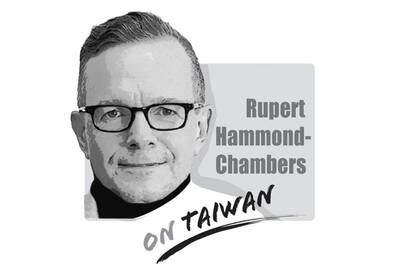With next month's mayoral and county commissioner elections fast approaching, whether or not Chen Yunlin (陳雲林), director of China's Taiwan Affairs Office, will be allowed to visit Taiwan has become a topic of much debate. This issue has become an important variable in election calculations.
Chen may well accept the invitation extended by the Chinese Nationalist Party (KMT) to attend a "KMT-CCP Forum" next month. The Straits Exchange Foundation (SEF) has even made a formal application to China's Association for Relations Across the Taiwan Strait (ARATS) to negotiate the formalities surrounding the visit. Meanwhile, pan-blue legislators yesterday canceled the Mainland Affairs Council's (MAC) entire budget for next year to put pressure on it to process Chen's invitation. This action simply serves to reinforce the impact of a possible visit by Chen.
Chen's motive for coming to Taiwan is ostensibly to participate in the forum and improve his understanding of Taiwan. The fact is, however, that as director of the Taiwan Affairs Office, Chen is already familiar with Taiwanese affairs. And having received a steady stream of pan-blue politicians in Beijing over recent months, neither is he a stranger to Taiwanese politicians. Rather than the stated intention, the purpose of his visit is to promote China's "united front" strategy by knitting the KMT, the People First Party and the New Party even more closely together in their opposition to the Democratic Progressive Party (DPP) and the Taiwan Solidarity Union.
As he is in charge of both the Taiwan Affairs Office and ARATS, and thus the Chinese official most closely concerned with Taiwan affairs, a visit by Chen is no ordinary occasion. This is of course something that neither the MAC nor the SEF can ignore. Regardless of whether Chen meets with officials from these two organizations or other government officials, there is protocol to follow and security matters to arrange. The slightest oversight could lead to cross-strait conflict or an international incident, and this is why it is only reasonable that the SEF wishes to discuss arrangements of the visit with ARATS.
China's avoidance of official contact with the SEF is its way of telling the world that it is intentionally boycotting cross-strait contact and dialogue. This can only have a negative impact on cross-strait peace. Chen's disrespect for the people of Taiwan, his possible hosts, is offensive to say the least. The Taiwanese people should not take this lying down. The issue has been aggravated by the budget-slashing actions of the pan-blue camp. It is a case of beating the host to please the guest. Pandering to China in this way, so close to the elections, will certainly have an impact on the results.
President Chen Shui-bian (陳水扁) has received a hammering for his entanglement in the scandal involving former Presidential Office deputy secretary-general Chen Che-nan (陳哲男). The DPP's election campaign has been in disarray as a result, but the emergence of this new issue has opened another front. Polemics on cross-strait relations have always been the DPP's forte, and now that the pan-blue camp has made the opening moves, it doesn't really matter if Chen actually visits. With this issue slowly coming to the boil, the DPP campaign has got a second wind, and tonight President Chen should be able to sleep more easily in his bed.
Having lived through former British prime minister Boris Johnson’s tumultuous and scandal-ridden administration, the last place I had expected to come face-to-face with “Mr Brexit” was in a hotel ballroom in Taipei. Should I have been so surprised? Over the past few years, Taiwan has unfortunately become the destination of choice for washed-up Western politicians to turn up long after their political careers have ended, making grandiose speeches in exchange for extraordinarily large paychecks far exceeding the annual salary of all but the wealthiest of Taiwan’s business tycoons. Taiwan’s pursuit of bygone politicians with little to no influence in their home

In 2025, it is easy to believe that Taiwan has always played a central role in various assessments of global national interests. But that is a mistaken belief. Taiwan’s position in the world and the international support it presently enjoys are relatively new and remain highly vulnerable to challenges from China. In the early 2000s, the George W. Bush Administration had plans to elevate bilateral relations and to boost Taiwan’s defense. It designated Taiwan as a non-NATO ally, and in 2001 made available to Taiwan a significant package of arms to enhance the island’s defenses including the submarines it long sought.
US lobbyist Christian Whiton has published an update to his article, “How Taiwan Lost Trump,” discussed on the editorial page on Sunday. His new article, titled “What Taiwan Should Do” refers to the three articles published in the Taipei Times, saying that none had offered a solution to the problems he identified. That is fair. The articles pushed back on points Whiton made that were felt partisan, misdirected or uninformed; in this response, he offers solutions of his own. While many are on point and he would find no disagreement here, the nuances of the political and historical complexities in
Taiwan faces an image challenge even among its allies, as it must constantly counter falsehoods and misrepresentations spread by its more powerful neighbor, the People’s Republic of China (PRC). While Taiwan refrains from disparaging its troublesome neighbor to other countries, the PRC is working not only to forge a narrative about itself, its intentions and value to the international community, but is also spreading lies about Taiwan. Governments, parliamentary groups and civil societies worldwide are caught in this narrative tug-of-war, each responding in their own way. National governments have the power to push back against what they know to be